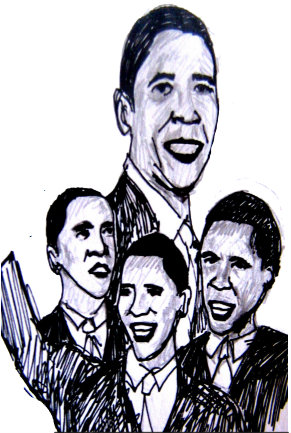What’s Wrong with Obama?
 We seem to love to consume the myth that some man will lead us to the promised land absent any real struggle or sacrifice on our part. In this, as in other aspects, Barack Obama is a product of the politics of our day. We not only adore the myth that a man will give us a good speech and lead us to progress, we adore the idea that we won’t be required to do any real work or make any real sacrifice ourselves. In fact, with Obama we seem to get the ecstatic feelings that accompany the success of great change without any of the costs. This, of course, is a clear description of the state of our culture: we customarily demand instant gratification without the great costs and great work required to bring it about.
We seem to love to consume the myth that some man will lead us to the promised land absent any real struggle or sacrifice on our part. In this, as in other aspects, Barack Obama is a product of the politics of our day. We not only adore the myth that a man will give us a good speech and lead us to progress, we adore the idea that we won’t be required to do any real work or make any real sacrifice ourselves. In fact, with Obama we seem to get the ecstatic feelings that accompany the success of great change without any of the costs. This, of course, is a clear description of the state of our culture: we customarily demand instant gratification without the great costs and great work required to bring it about.
In addition to great change - or rather, Change - Obama promises us a unity that will subsume the partisan rancor of the past few years. Sure, we detest that partisanship. (Unless, of course, you were one of the factions that benefited, in which case partisanship has been the vehicle with which you realized your particular special interest.) But does detestation of partisanship mean that good articulation will suffice to change it?
The national political discourse of the past twenty-five years has taken two specific ideas as an acceptable starting point for debate: supply-side economics and limited social responsibility of the government. It will require a great deal of work, and probably partisan struggle, to enact a progressive legislative agenda that addresses the long-standing dominance of those ideas. Obama’s ‘message of hope’ is not going to persuade the lobbying industry to forego over one billion dollars a month in revenue, it is not going to persuade the Supreme Court to rule in favor of meaningful campaign finance reform, and it is not going to convince the oil industry that fossil fuels may, in fact, be an environmentally unsustainable energy solution.
Obama’s ‘message of hope’ is a stump speech designed to win votes. And boy is it effective. We are, as a nation, starved for hope. But what will we do if this hope does not materialize into substantive policy changes? Because those speeches are not going to change either the policy agenda or systemic functionality of the federal government. That would demand significant commitment by a large number of individuals working for change on a grassroots level.
This grassroots context for great change is characteristically omitted when we return to tell the story of that change in the ages that follow. It is customary to focus on the spokesman instead of the many individuals who made the spokesman relevant. The most pertinent example from the last fifty years is the civil rights movement.
The myth that has been engendered is that Rev. Dr. Martin Luther King, Jr. is eponymous with the civil rights movement, beginning with the Montgomery Bus Boycott. In fact, King was chosen to be the spokesperson for that boycott primarily because he was a young novice and consequently had no enemies in Montgomery who would resist his visible role on personal grounds. As the civil rights movement grew in the public consciousness, King’s role as spokesman grew along with it, evolving into a leadership role more akin to how he is depicted today. However, a quick glance at photos of the Edmund Pettus Bridge on Bloody Sunday or of the National Mall during the March for Jobs and Freedom reminds us that the movement was far more than a man gifted in oratory. The movement consisted of hundreds of thousands of individuals, fed up with a system that did not represent the noblest possibilities of human life.
Rosa Parks is a perfect example of this duality between the myth of a man as the movement versus the reality of the work of committed activists. Rosa Parks was not a bone-tired black woman who’d had a particularly long day at work. She was a sick-and-tired political activist who had recently emerged from an activist training school in the hills of Tennessee. In other words, she had done preparatory work. She, along with many others, was dedicated to righting unjust policies. As pivotal as King was, his speaking would have gone unnoticed if there had not been individuals committed to fighting for progress.
Progressive change is a result of many, many individuals coming together in their conviction that another world is possible. The extent of that change is often proportional to the amount of time and energy dedicated to holding the government accountable to the public will. No single man can compensate for the power of a focused group of citizens organizing and mobilizing for positive change. It is neither plausible nor desirable that a single individual be expected to lead the body politic to the promised land of civic salvation.
Obama is right; we are the Change we have been waiting for.
